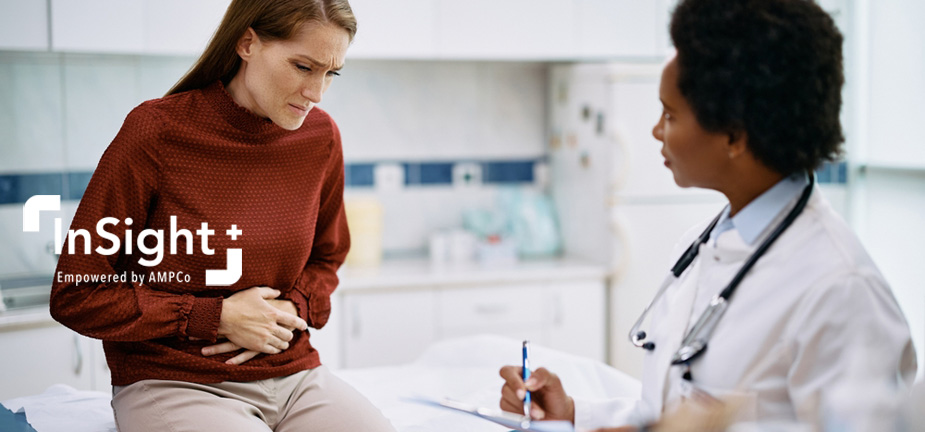This inSight+ article, authored by Dr Jacqueline Frayne, A/Prof Magdalena Simonis AM and A/Prof Alan Lam detail how a new tool, called the Raising Awareness Tool for Endometriosis (RATE), has been developed to help prompt early conversations between health providers and women about endometriosis-related symptoms, in efforts to improve early detection.
New Australian tool aims to prompt conversations about endometriosis [inSight+ article Extract]
Endometriosis is a chronic medical condition which, according to the Australian Government Institute of Health and Welfare’s most recent report affects around one in seven women who are diagnosed by the age of 44–49 years. Despite its high prevalence, endometriosis is frequently under recognised.
Endometriosis represents a significant burden for those affected, their partners, and families, as well as a significant cost to society in terms of economic and social involvement. The economic burden alone is estimated to cost $6.5 billion dollars annually measured in absenteeism, loss of social and economic participation and use of the health system. More needs to be done to support both women and primary health at a general level, noting that the Australian Government’s funding allocation for 20 national specialised clinics is a positive step.
The pathway that leads to its eventual diagnosis is reported as challenging from the perspective of the women, girls and people living with this condition and primary health care providers who are often general practitioners. This may be due to the myriad symptoms associated with this condition. Typically, these include dysmenorrhoea, pelvic pain, heavy menstrual bleeding, and in up to 30%, infertility, with symptoms such as dyspareunia, abdominal bloating, pain or bleeding on defaecation, chronic fatigue, irritable bowel symptoms and urinary symptoms being associated less often (here).
This can be further complicated for women and their doctors in that the nature and severity of endometriosis-associated symptoms can (anecdotally) fluctuate and vary over time, from menarche to menopause and sometimes beyond (here). Those who present with atypical symptoms, further face the frustration of not feeling heard or having their symptoms dismissed, resulting in delays before a diagnosis is made (here).
Continue Reading the Full Article on the inSight+ website. >>
by Dr Jacqueline Frayne, A/Prof Magdalena Simonis AM, A/Prof Alan Lam
29 January 2024
(Credits: Article- inSight+ / Stock-Drazen Zigic/ Shutterstock)
Associate Professor Magdalena Simonis AM is a Past President of the AFMW (2020-2023), former President of VMWS (2013 & 2017-2020) and current AFMW National Coordinator (2024-2026). She is a full time clinician who also holds positions on several not for profit organisations, driven by her passion for bridging gaps across the health sector. She is a leading women’s health expert, keynote speaker, climate change and gender equity advocate and government advisor. Magda is member of The Australian Health Team contributing monthly articles.
Magdalena was awarded a lifetime membership of the RACGP for her contributions which include past chair of Women in General Practice, longstanding contribution to the RACGP Expert Committee Quality Care, the RACGP eHealth Expert Committee. She is regularly invited to comment on primary care research though mainstream and medical media and contributes articles on various health issues through newsGP and other publications.
Magdalena has represented the RACGP at senate enquiries and has worked on several National Health Framework reviews. She is author of the RACGP Guide on Female Genital Cosmetic Surgery and co-reviewer of the RACGP Red Book Women’s Health Chapter, and reviewer of the RACGP White book
Both an RACGP examiner and University examiner, she undertakes general practice research and is a GP Educator with the Safer Families Centre of Research Excellence, which develops education tools to assist the primary care sector identify, respond to and manage family violence . Roles outside of RACGP include the Strategy and Policy Committee for Breast Cancer Network Australia, Board Director of the Melbourne University Teaching Health Clinics and the elected GP representative to the AMA Federal Council. In 2022. she was award the AMA (Vic) Patrick Pritzwald-Steggman Award 2022, which celebrates a doctor who has made an exceptional contribution to the wellbeing of their colleagues and the community and was listed as Women’s Agenda 2022 finalist for Emerging Leader in Health.
Magdalena has presented at the United Nations as part of the Australian Assembly and was appointed the Australian representative to the World Health Organisation, World Assembly on COVID 19, by the Medical Women’s International Association (MWIA) in 2021. In 2023, A/Professor Simonis was included on the King’s COVID-19 Champion’s list and was also awarded a Member (AM) in the General Division for significant service to medicine through a range of roles and to women’s health.

